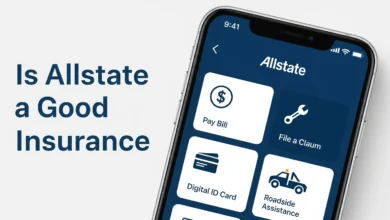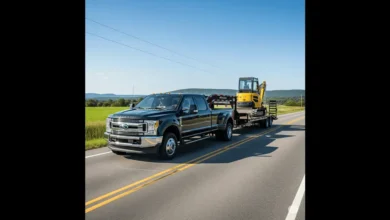The Real Deal on Total Trucking Insurance: Your Friend’s Guide to Not Going Broke (2025 Edition)
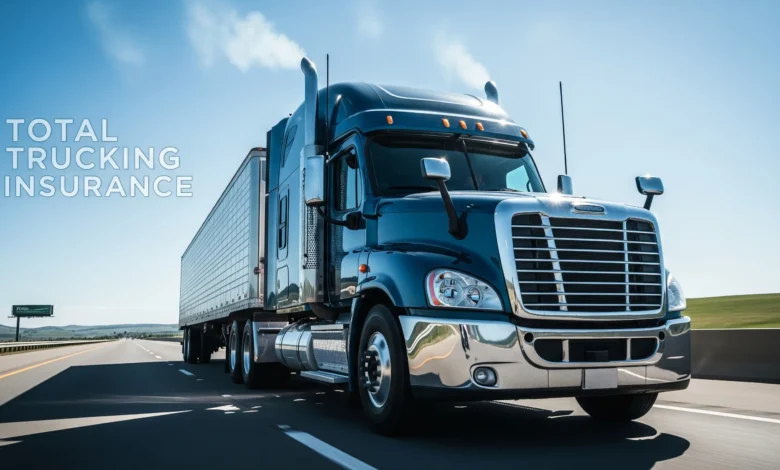
Introduction
Hey there! So you’re thinking about getting into trucking, or maybe you’re already rolling but scratching your head over insurance costs? Yeah, I get it. Let me tell you – trucking insurance is like that friend who’s essential but also ridiculously expensive to hang out with.
Here’s the thing: America runs on trucks. I’m not being dramatic here – about 70% of everything you see around you got there on the back of an 18-wheeler. Your morning coffee? Trucked in. That new phone you’re obsessing over? Yep, trucked. But here’s what they don’t tell you in those “become a trucker” ads – the insurance part is gonna make your wallet cry a little (okay, maybe a lot).
We’re talking monthly premiums that can hit $1,500-$2,000 per truck. I know, I know – it’s enough to make you consider becoming a yoga instructor instead. But before you throw in the towel, let me walk you through this whole total trucking insurance maze like I would if we were sitting at a truck stop diner sharing pie.
I’ve been around this industry long enough to know where the pitfalls are, and trust me, there are ways to make this work without selling a kidney. By the time we’re done here, you’ll know exactly what coverage you need (spoiler: it’s probably not as much as some agents will try to sell you), why these rates are so crazy high, and – most importantly – how to keep more money in your pocket while still staying protected.
We’re gonna cover all the insurance types that matter, figure out why trucking insurance costs more than a small country’s defense budget, learn some sneaky-but-legal ways to lower those rates, and I’ll even tell you which companies are worth your time and which ones you should avoid like a weigh station when you’re overweight.
What is Commercial Total Trucking Insurance and Why is it Essential?
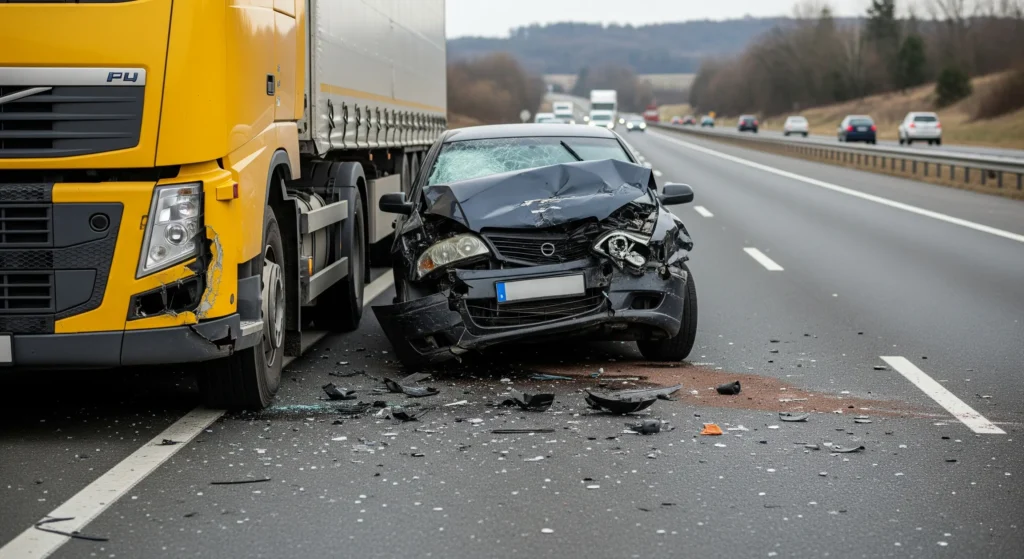
Alright, let’s start with the basics without making this sound like a textbook nobody wants to read. Commercial trucking insurance is basically regular car insurance’s big, tough older brother who went to the gym way too much. It’s specifically designed for vehicles that work for a living – you know, actually making money instead of just sitting in a driveway looking pretty.
Why You Absolutely, Positively Can’t Skip This
The Feds Don’t Mess Around. Look, I wish I could tell you that insurance was optional, but the Federal Motor Carrier Safety Administration (FMCSA) is like that strict teacher who checks your homework. They require specific coverage amounts, and trust me, you don’t want to find out what happens if you don’t have it. We’re talking fines, license suspensions, and the kind of legal headaches that’ll make you nostalgic for simpler problems like flat tires.
When Things Go Wrong Here’s the deal – when a car gets into a fender-bender, it’s annoying. When an 80,000-pound truck has an oops moment, it can turn into a million-dollar disaster faster than you can say “litigation.” Your insurance is what stands between a bad day and complete financial ruin. It covers everything from fixing your rig to paying medical bills to handling those lawyers who seem to multiply like rabbits after any truck accident.
Getting the Good Loads Here’s something they don’t always tell new drivers: most shippers and brokers are pickier than my grandmother choosing produce at the grocery store. They want to see proof of proper insurance before they’ll even consider letting you haul their stuff. Action over exclusion means being proactive about getting the right coverage so you’re not stuck hauling cheap freight while the good-paying loads go to properly insured competitors.
Keeping the Lights On Downtime is the enemy of every trucking operation. Good insurance doesn’t just write checks – it helps get you back on the road fast. Some policies hook you up with rental trucks, expedited repairs, and other services that keep the money flowing instead of watching your business die a slow death in a repair shop parking lot.
Taking Care of Your People Whether you’re driving solo or running a fleet, people can get hurt. Workers’ comp and other coverage make sure that when someone gets injured on the job, they’re taken care of without you having to choose between paying medical bills and keeping your business afloat.
Who Needs Commercial Total Trucking Insurance?
Short answer: If you’re using a truck to make money, you need this stuff. But let me break it down because the devil’s always in the details, right?
The Usual Suspects
Owner-Operators (That’s Probably You) If you own your truck and you’re out there hustling for loads, you need your policy. You can’t just hope someone else’s insurance will cover you – that’s like showing up to a potluck empty-handed and hoping nobody notices.
Motor Carriers: These are the companies that either own a bunch of trucks or work with independent contractors. If you’re thinking about starting a trucking company or you already run one, this is your category.
Private Carriers: Got a business that uses its trucks to move its stuff? Congratulations, you still need commercial coverage. That delivery truck, company van, or any vehicle with your business name on it needs proper insurance.
Contract Haulers Working under someone else’s authority doesn’t always mean you’re covered under their policy. Make sure you know exactly what you’re covered for and what gaps you need to fill – nobody likes surprises, especially expensive ones.
What Kind of Trucks Are We Talking About?
Pretty much anything commercial. Over-the-road semis, dump trucks, flatbeds, car haulers, tow trucks, those fancy refrigerated trailers (reefers), hotshot trucks, tankers, logging trucks – if it’s working for a living, it needs coverage. Each type has its special risks and requirements, kind of like how different dog breeds need different kinds of care (except trucks are way more expensive when they get into trouble).
Key Types of Commercial Truck Insurance Coverage
Okay, time for the fun part – figuring out what all these different types of coverage do. Think of this like building the perfect burger – each layer serves a purpose, and skipping the wrong one can leave you with a mess.
Primary Auto Liability (The Must-Have Foundation)
This is your bread and butter, the coverage you absolutely cannot operate without. It covers bodily injury and property damage to other people when you mess up. The FMCSA says you need anywhere from $750,000 to $5 million, depending on what you’re hauling and where you’re going. But here’s a pro tip: those minimums are like wearing flip-flops to climb Mount Everest – technically footwear, but probably not gonna cut it when things get serious.
Physical Damage Coverage (Protecting Your Baby)
This covers your truck and trailer when bad things happen – crashes, theft, fire, vandalism, acts of nature, and all that fun stuff. It usually splits into collision (for when you hit something or something hits you) and comprehensive (for pretty much everything else that can go wrong). When you’re looking at a truck that costs more than most people’s houses, this becomes pretty important real quick.
Cargo Insurance (Because Other People’s Stuff Matters Too)
This covers the stuff you’re hauling when it gets damaged, stolen, or goes missing. Sounds straightforward, right? Well, hold your horses, because cargo insurance has more exclusions than a fancy restaurant has rules about dress codes.
Watch Out for These Cargo Coverage Gaps:
- High-value stuff like artwork, jewelry, or cash (basically anything you’d find on an episode of “Storage Wars”)
- Live animals (apparently, insurers don’t want to deal with explaining to a farmer why his cows went missing)
- Certain types of vehicles being transported
- Stuff that’s been sitting in a warehouse for more than 72 hours (because warehouses are where cargo goes to become uninsurable)
- Some types of food that can spoil
The lesson here? Read the fine print like your business depends on it, because it probably does.
Non-Trucking Liability/Bobtail Insurance (For When You’re Off Duty)
This covers you when you’re using your truck for personal stuff or driving around without a trailer (even if you’re technically still on the clock). It’s like the insurance equivalent of casual Friday – it covers the times when you’re not in full work mode but still need protection.
General Liability (The Stuff That Happens Off the Road)
This isn’t about driving – it’s about all the other ways your business can get into trouble. Someone slips and falls at a loading dock, you accidentally damage property while making a delivery, or something goes wrong at your office. It’s protection for when Murphy’s Law decides to visit your business operations.
Workers’ Compensation (Taking Care of Your Team)
If you’ve got employees, this covers their medical expenses and lost wages when they get hurt on the job. Here’s a fun Texas fact: Texas is the only state that doesn’t require workers’ comp, but most companies still get Occupational Accident Insurance instead. Either way, protecting your people protects your wallet.
Specialty Coverage (For the Special Stuff)
Depending on what you haul, you might need extra protection. Hazardous materials, oversized loads, specialized equipment – they all come with their own risks and coverage requirements. This might include environmental cleanup coverage (for when things get messy) or spoilage protection for refrigerated goods.
Trailer Interchange Insurance (When It’s Not Your Trailer)
If you’re pulling trailers that belong to someone else, this protects those trailers while they’re hooked to your truck. It’s especially important if you regularly swap equipment with other carriers.
Business Owner’s Policy (The Value Meal Option)
This bundles General Liability, Commercial Property, and Business Interruption Insurance into one package. For smaller operations, it can be like getting the combo meal instead of ordering everything separately – convenient and potentially cheaper.
Decoding Commercial Total Trucking Insurance Costs: Why Your Wallet Hates This Industry

Let’s talk about the elephant in the room – why total trucking insurance costs more than a luxury car payment. We’re looking at $8,000-$15,000 per year for owner-operators, with monthly premiums that can hit $600-$2,000 per truck. So what gives?
The Reality of Risk
Accidents Happen… Over 500,000 truck-related crashes happen every year in the U.S. When you’re dealing with vehicles that can weigh 80,000 pounds and travel at highway speeds, even small mistakes can turn into big, expensive problems. Insurance companies aren’t charging high rates to be mean – they’re covering a lot of claims.
The “Nuclear Verdict” Nightmare. This is insurance speak for jury awards over $10 million. These massive settlements have become scarily common, especially in certain areas where juries seem to think trucking companies print money in their spare time. Insurance companies have to prepare for these worst-case scenarios, which means everyone pays more.
Everything Costs More Now. Parts shortages, longer repair times, higher labor costs – when your truck needs work, it’s not just expensive, it takes forever. More downtime means higher costs for everyone involved.
What Makes Your Rates Go Up (Or Down)
Your Truck’s Fancy Factor. More expensive trucks cost more to insure – shocking, I know. But it’s not just about the purchase price. Newer trucks with all the latest technology might be safer, but they’re also more expensive to fix when something goes wrong.
Geography Matters. Some places are just riskier than others. Big cities with lots of traffic, states with lawsuit-happy courts, or areas with crazy weather all factor into your rates. It’s like real estate – location, location, location.
Your Driving Record is Everything. This is the big one. A clean driving record can save you thousands, while violations and accidents will cost you for years. Every ticket, every accident, every safety violation stays on your record and makes insurance companies nervous.
What are you hauling computers? Expensive to insure. Hauling gravel? Much cheaper. High-value cargo or hazardous materials automatically put you in a higher risk category.
How Much Coverage Do You Want? Higher limits mean higher premiums, but they also mean better protection. It’s like buying a bigger umbrella – costs more upfront, but you’ll be glad you have it when it’s pouring.
Your Claims History: Previous claims make insurance companies think you’re accident-prone, even if it wasn’t your fault. It’s not fair, but it’s how the system works.
Your Credit Score (Unfortunately) Yeah, your credit affects your insurance rates. Better credit often means lower premiums because insurers think responsible financial behavior carries over to responsible driving.
Flying Solo vs. Leasing On Independent owner-operators typically pay more than drivers leased to established companies because they’re taking on more business risk.
How Far You Roam Long-haul operations face different risks than local routes. More miles, more states, more variables – all things that can affect your rates.
Your Safety Score Out-of-service violations, poor safety ratings, or compliance issues signal to insurers that you might be a higher risk. Keep your safety scores clean, and your rates will thank you.
Growing Too Fast Expanding your operation quickly can be seen as risky if you don’t manage it properly with your insurance company.
Strategies to Lower Your Commercial Truck Insurance Rates
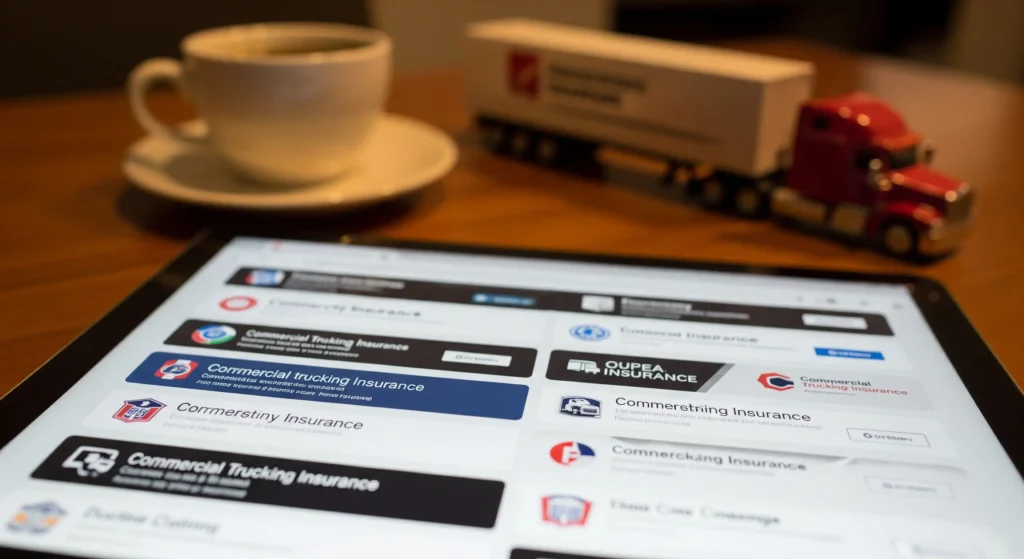
Now for the good stuff – how to keep more money in your pocket while still staying properly covered. Action over exclusion means being smart and proactive about managing your insurance costs instead of just accepting whatever rates you’re quoted.
The Big Impact Moves
Keep Your Record Cleaner Than Your Windshield. I can’t stress this enough – your driving record is the single biggest factor in your insurance rates. Every speeding ticket, every accident, every DOT violation is like a little red flag telling insurers you’re risky. Defensive driving courses, staying alert, following regulations – it all adds up to real money in your pocket.
Hire Drivers Who Know What They’re Doing. If you’re running a fleet, experienced drivers with clean records are worth their weight in gold. They might cost more upfront, but they’ll save you a fortune in insurance costs and claims.
Consider Upgrading Your Ride. Newer trucks with safety features like collision avoidance, lane departure warnings, and electronic stability control can sometimes qualify for discounts. Just remember that while they might be safer, they’re also more expensive to fix.
Smart Business Moves
Plan Your Routes Like a Chess Master. When you can, avoid high-traffic areas and severe weather conditions. Insurance companies track patterns, and if you can show you’re avoiding high-risk situations, it can help your rates.
Clean Up Your Credit. Work on improving your company’s credit profile. It might seem unrelated to trucking, but better credit can directly translate to lower insurance premiums.
Pay Smart. If you can swing it, paying your premiums quarterly or annually instead of monthly often comes with discounts. It’s like buying in bulk – same coverage, lower price.
Raise Your Deductible: Choosing a higher deductible can significantly lower your premiums. Just make sure you can handle the out-of-pocket cost if something happens.
Technology That Pays for Itself
Get Some Gadgets Telematics systems, dash cams, and monitoring equipment aren’t just cool toys – they provide valuable data that insurance companies love. Good data can lead to better rates, and the evidence can be crucial if you need to file a claim.
Embrace the Cameras: Dashboard cameras and other monitoring equipment can save you big time in disputed claims. They’re like having a digital witness that never forgets what happened.
Shopping Smart
Bundle Up. Many insurers offer discounts for combining different types of coverage with the same company. It’s convenient and can save you money.
Find a Specialist. Work with independent agents or brokers who actually understand trucking. They know the industry, they know which companies are trucker-friendly, and they often have access to markets that general insurance agents don’t.
Selecting the Right Commercial Total Trucking Insurance Provider
Choosing an insurance company is like picking a business partner – you want someone who’s got your back when things get tough, not just someone who’s happy to take your money when times are good.
What Really Matters (Beyond Just Price)
Coverage That Fits Make sure the company offers coverage that matches what you actually do. Cookie-cutter policies are great for cookies, not so much for trucking operations.
Customer Service That Doesn’t Suck. When you’re broken down at 2 AM in the middle of nowhere, you want someone to answer the phone. Look for companies with 24/7 support and a reputation for being helpful instead of just reading scripts.
A Claims Process That Doesn’t Make You Want to Scream. This is where companies either shine or show their true colors. How fast do they process claims? Do they fight you on every little thing, or do they actually try to help? Check online reviews and ask other truckers about their experiences.
Financial Strength (Because Bankrupt Insurers Can’t Pay Claims) You want an insurance company that’s going to be around to pay out when you need it. Look for strong ratings from AM Best (A- or better is good) and other rating agencies.
They understand that Trucking Companies that specialize in trucking the unique risks and challenges you face. They’re more likely to offer appropriate coverage and reasonable pricing because they understand what they’re insuring.
No Hidden Surprises. You should get clear explanations of what everything costs and what’s covered. If a company can’t explain its pricing or keeps giving you vague answers, that’s a red flag.
Flexibility When You Need It. Your needs might change based on seasons, different types of loads, or business growth. Choose a company that can adapt with you instead of making you jump through hoops every time you need an adjustment.
Red Flags to Run From
Be careful with Risk Retention Groups – they might not have enough money to pay large claims when the chips are down. Also, be suspicious of any company that seems way too eager to write a policy without asking many questions about your operation. If it seems too good to be true, it probably is.
Top Commercial Total Trucking Insurance Companies of 2025
Alright, let’s talk about who’s worth your time and money in the total trucking insurance game. I’ve dealt with most of these companies over the years, so here’s the real scoop.
Progressive Total Trucking Insurance
The All-Around Good Choice for Small Operations
Progressive has stepped up its trucking game. What I like about them is that you can get quotes online (crazy concept, right?), and their policies are pretty customizable. They’ve got solid ratings from both AM Best and the BBB, and they understand that different types of trucking need different coverage. Their programs for for-hire operations are pretty well thought out.
OOIDA Trucking Insurance
The Owner-Operator’s Best Friend
The Owner-Operator Independent Drivers Association isn’t just selling insurance – they’re fighting for independent truckers. Their insurance program offers competitive rates with fast underwriting, and here’s the kicker: they advocate for their customers instead of just collecting premiums. If you’re an owner-operator, these folks get what you’re dealing with.
The Hartford
For When You Need the Big Guns
If you’re running a larger operation, Hartford brings some serious resources to the table. Their FleetAhead program and risk engineering services can help prevent problems instead of just paying for them after they happen. Their ratings are excellent, and they can handle everything from basic liability to complex umbrella coverage.
CoverWallet
For the Comparison Shoppers
CoverWallet is like the Expedia of trucking insurance – they let you compare quotes from multiple companies quickly. They’re particularly good at finding discounts and can often find coverage even if you’ve got some dings on your record or credit issues.
Lancer Insurance
When You Want Good Customer Service
Lancer’s 24/7 customer service and in-house claims handling set them apart. When something goes wrong, you’re dealing with people who work for the company, not some third-party call center in who-knows-where. Their ratings are solid, and they throw in some nice extras like free towing.
Evolution Insurance Brokers
For the “Challenging” Cases
If you’re dealing with a less-than-perfect driving record, hazardous cargo, or other complications, Evolution specializes in finding coverage for high-risk situations. They’ve been around the trucking block long enough to know how to work with difficult cases.
A Few More Worth Mentioning
Sentry Insurance has kept an A+ rating for over 30 years, which is pretty impressive in this industry. They focus on larger fleets and long-haul operations.
Great West Casualty only does trucking insurance, so they really know the business inside and out.
Roadex™ markets itself as “for truckers, by truckers” and offers some flexible payment options that can help with cash flow.
Northland Insurance has been around for over 75 years and maintains dedicated claims teams, which usually means faster service.
The key is finding a company that fits your specific situation, not just going with whoever’s cheapest or has the flashiest advertising.
Financing Your Total Trucking Insurance Policy
Let’s be real – dropping $10,000+ for annual insurance premiums can be tough on the cash flow, especially when you’re just getting started or dealing with seasonal fluctuations. Here are some ways to spread out those costs without breaking the bank.
Financing Options That Make Sense
Business Line of Credit: This is like having a credit card for your business, but with better terms. You only pay interest on what you use, making it perfect for covering insurance premiums and other irregular expenses.
Short-Term Business Loans These are designed for exactly this kind of situation – you need a chunk of money for a specific purpose (like paying insurance), and you want predictable payments to pay it back.
Working Capital Loans recognize that trucking businesses have unique cash flow patterns. They’re designed specifically for ongoing business needs like insurance, maintenance, and payroll.
Equipment Financing with Insurance Bundled Sometimes, you can roll insurance costs into equipment financing, especially when you’re buying new trucks. It’s convenient and can sometimes get you better terms.
Programs for Newer Businesses Some lenders specialize in working with businesses that don’t have perfect credit or long operating histories. They understand that everyone has to start somewhere.
SBA and Traditional Bank Loans. If you’ve got solid financials and have been around for a while, these can offer the best terms for financing insurance and other business needs.
The trick is finding financing that matches your cash flow without creating more financial stress than you already have.
What to Do in Case of a Truck Accident
Nobody wants to think about this stuff, but being prepared can make the difference between a bad day and a complete disaster. Here’s what you need to do if things go sideways.
Your Action Plan (When Everything Hits the Fan)
- Safety First, Everything Else Second. Get to a safe spot if you can, check if anyone’s hurt, and set up flares or reflectors. Other drivers might not see a stopped truck, especially at night or in bad weather.
- Call the Cops, No Matter What. Even if it seems minor, get police involved for an official report. You’ll need this for your insurance claim, and it protects you legally.
- Document Like Your Life Depends on It: Take pictures of everything – all vehicles, the scene, road conditions, damage, license plates, everything. Your phone is your best friend here.
- Get Everyone’s Info: Contact and insurance information from all drivers involved, plus witnesses if there are any. Don’t rely on your memory – write it down or put it in your phone.
- Call Your Insurance Company ASAP Don’t wait until you get home – call as soon as it’s safe. Give them all the details, photos, police report info, and witness contacts.
- Get Checked Out Medically. Even if you feel fine, get looked at by a medical professional. Some injuries don’t show up right away, and having medical documentation protects you.
- Stay on Top of Things: Keep in touch with your insurance company and provide any additional paperwork they need quickly. The faster you respond, the faster things get resolved.
Why Good Insurance Companies Matter Here
Companies that offer 24/7 roadside assistance and rapid response can make a huge difference in getting you back on the road. Time is money in trucking, and good insurance should minimize your downtime, not add to it.
Future Outlook for Commercial Trucking Insurance
So what’s coming down the road for trucking insurance? Well, if I had a crystal ball that worked, I’d probably be retired on a beach somewhere instead of writing about insurance. But here’s what the smart money is thinking.
The Market Isn’t Getting Friendlier Anytime Soon
We’re still in what the industry calls a “hard market” – rates are high, and insurance companies are picky about who they’ll cover. This is expected to continue for a while, so don’t hold your breath waiting for rates to drop dramatically.
Technology is Changing Everything
Dash cams, telematics, and all those sensors and gadgets are becoming standard equipment instead of optional extras. The good news is that all this data should eventually lead to more accurate pricing based on actual performance instead of broad generalizations.
Bigger Companies Are Taking Over
As insurance costs squeeze smaller carriers out of the market, we’re seeing more consolidation. Larger, well-managed fleets often have better loss records, which could eventually help stabilize rates across the industry.
Relief Might Be Coming (Someday)
High premiums are expected to eventually attract more insurance companies to the trucking market. More competition should drive prices down, but nobody’s quite sure when this will happen.
The bottom line? Trucking insurance is likely to remain expensive for the foreseeable future, which makes smart shopping and good risk management more important than ever.
Conclusion
Look, I’m not gonna sugarcoat it – total trucking insurance is complicated, expensive, and sometimes frustrating. But it’s also essential for protecting your business and your livelihood. The good news is that you don’t have to navigate this maze blindfolded.
The most important thing to remember is that the cheapest option isn’t always the best deal. You want an insurance company that’ll be there when you need them, not one that disappears faster than free donuts at a truck stop when it’s time to pay a claim.
Action over exclusion means taking control of your insurance situation instead of just accepting whatever you’re offered. Shop around, ask questions, work with agents who actually understand trucking, and don’t be afraid to negotiate. A good insurance agent should be able to explain everything in plain English and help you find coverage that fits your specific needs and budget.
Your next steps? Get quotes from multiple companies, talk to other truckers about their experiences, and understand what you’re buying. Don’t just look at the premium – understand the coverage limits, deductibles, and exclusions. Ask about discounts, payment options, and what the claims process looks like.
The trucking industry isn’t getting any safer or less expensive, but with the right insurance and a proactive approach, you can protect your operation and keep making money on the road. Now quit worrying about insurance and go make some money – just make sure you’re properly covered while you’re doing it!
